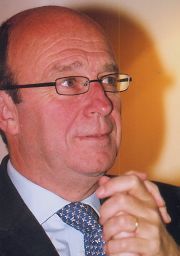Head of Sudan’s peace body upbeat on prospects for CPA implementation
April 28, 2009 (KHARTOUM) – The Chairman of the Assessment and Evaluation Commission (AEC), Sir Derek Plumbly, said that major priorities for implementation of the north-south peace agreement could be achieved within this calendar year, but drew attention to the narrowing window for this opportunity.

The other members of the commission are representatives the United Kingdom, Ethiopia, Kenya, Italy, the Netherlands, Norway and the US – international participants whose stake in the AEC stems from their respective roles in forging the 2005 Comprehensive Peace Agreement at Naivasha between the Sudan People’s Liberation Movement and the Government of Sudan, which are also represented on the commission.
In a speech in Friendship Hall in Khartoum on Monday, Plumbly said “The time remaining for implementation is short. Only twenty months remain of the interim period. The narrowing window means that the pace of implementation must increase.” Then he went on to outline some positive indications and made suggestions.
Describing a trip by the AEC to Blue Nile state, he suggested “a lot of what we saw and heard was positive.”
First, he referred to redeployment of the Sudan People’s Liberation Army (SPLA) south of the 1/1/56 border. Second, he noted that he had observed discussion of integration of the police and security services in the Kurmuk area, which the SPLA formerly controlled. Third, he remarked on the successful demobilization of 2000 Northern personnel, along with the arrival of the first 100 SPLA personnel at a demobilization centre.
Plumbly also went on to encourage the two peace partners to “make unity attractive” to the people of Southern Sudan before the referendum, while declaring “The right of the people of the south to self determination as set out in the agreement is unconditional.”
“The recommendations the AEC submitted last year in its Mid Term Evaluation reflected the concern to make unity attractive which lies at the heart of the CPA. The elections will be important with regard to that aspiration. Referenda are by their very nature uncertain and anybody familiar with public sentiment in the south will know that a vote for secession is a possibility. But it would be wrong to conclude that this in some way negated the need for partnership of which I have been speaking,” said the AEC chairman.
“Of course we should strive tirelessly to make unity attractive. But the choice is theirs…. Let us work for unity but also be careful to ensure that partnership, interdependence and peace are sustained whatever happens,” he urged.
However, Plumbly also made note of some major problems. Remarking on a meeting held by the AEC April 13 with the leadership of the ad hoc technical committee for border demarcation, he commented “the discussion was helpful, but gave rise to considerable concern.”
“The fact of the matter is that the ad hoc committee is stuck,” he disclosed.
The semi-autonomous Government of Southern Sudan, a key part of the interim period outlined in the CPA, currently faces a large budget shortfall due to lowered oil revenues oil, periodic tribal fighting in areas – Plumbly mentioned Jonglei in particular – and general insecurity.
Some of these realities were reflected in Plumbly’s speech, in which he also mentioned lack of integration in the Joint Integrated Units and lack of budget for the administration of Abyei.
He also opined that “major steps have still to be taken in preparation for elections,” saying that his commission “has also consistently linked the holding of successful elections to completion of the draft legislation currently under discussion between the parties.”
Discussion over the press and media law in the National Assembly last week resulted in a furor that culminated in death threats against the SPLM caucus chairman, Yasser Arman. Other legislation is delayed, such as a referendum law outlining how the 2011 referendum is to be held.
Delays in the elections law, which passed only last July, helped to push back the date of the July 2009 elections to February 2010; but Plumbly noted that the January 2011 deadline is absolute and cannot be deferred.
(ST)
